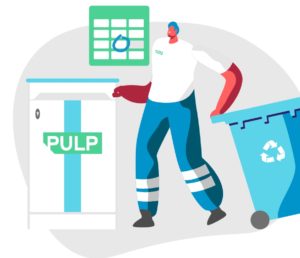When it comes to money, it’s sensible not to trust just anyone with confidential information. The same should be true for the financial documents your company handles. Why? Because these documents are as valuable as your money (and, in some cases, even more).
In the world of finance, trust is paramount. When you protect sensitive client data and uphold privacy, you maintain that trust. But as the technology evolves and regulations grow to be complex, your financial institutions need to be vigilant to address the data security concerns.
How do you do that? This is where data destruction in financial services enters the picture. When your firm properly shreds financial records and securely wipes digital media, it saves costly data breaches as well as any potential reputational damage that comes with financial breaches.
Read on to understand why financial document shredding matters, what to shred, cost considerations, service provider qualifications, and steps to take for watertight data security.
The Importance of Confidential Shredding for Finance Companies
Think about it: Your company’s financial forecasts have sensitive and confidential data. For instance, Transaction details reveal histories of your firm purchases, and your customer information exposes lifestyles and behavioural patterns to fraudsters.
These financial documents may not seem intrinsically valuable at first. However, they contain information that is valuable enough for individuals with malicious intent to create a data breach, which is harmful to your company as well as your clients.
For instance, an investment report of your company has information about your firm’s investments. Not just vague information but more detailed content, like how much amount you’ve invested. Such specific information can give real leverage to thieves if mishandled or accessed by unauthorised parties. It can lead to manipulation of financial accounts (of your customers or your company), shifting your market position as a company, or even stealing valuable equipment. Not to mention a host of other issues, including identity fraud.
This is why purposeful document destruction is fundamental for finance sector businesses. Banks, investment firms, accounting offices, and other institutions deal in sensitive data ranging from:
- Bank account and routing numbers
- Tax statements
- Payroll files
- Wire transfer records
- Loan applications
- Credit reports
- Investment performance reports
- Audit papers
- Forecasts and valuations
But that’s not all: ensuring confidential shredding and other security measures to prevent data breach is a legal obligation. Under GDPR legislation, companies can face penalties of up to €20 million or 4% of global turnover if they don’t comply.
In short, financial breaches bring two-fold damage. It makes sense to ensure your firm has proper document destruction procedures in place.
For these reasons, a confidential shredding and certified destruction of inactive financial documents is necessary. Bottom line? It helps shield your financial institution against data theft, fraud activity, non-compliance penalties, and loss of customer faith.
Financial Documents You Should Shred
Now the question: what financial documents should you shred? Short answer: every document that has even small amounts of personal and confidential information.
For instance, your company may have certain records containing sensitive data that are no longer needed for standard operations. Give them to your shredder and dispose of them securely.
Some of the financial documents that your firm should shred or wipe when inactive include:
- Bank statements
- Cancelled or voided checks
- Credit/debit card receipts
- Loan applications
- Mortgage files
- Payment records
- Payroll paperwork
- Retirement and pension documents
- Tax filings
- Wire transfer confirmations
Additionally, any documents containing personal client information — like names, contact info, account details, Personal Public Service Numbers (PPSNs), signatures, etc. — you must securely destroy it. Also, don’t forget to wipe customer data from your digital devices as they can help you to prevent identity theft and breaches as well.
The same applies to sensitive internal documents like:
- Audit and compliance reports
- Business forecasts
- Contracts and legal documents
- Financial statements
- Investment performance analyses
- Valuations and projections
In short: your financial firm should establish retention schedules based on jurisdiction and destroy records immediately upon expiration. When you have the assistance of document shredding services, they also provide certificates of destruction that are legally valid.
The Process and Cost of Shredding
There’s no standard process or cost of shredding. It depends on various factors like your location, the volume of shreds, the provider you choose and the certifications they’ve from authority bodies.
Once your company identifies the confidential records for destruction, prepare your documents and call in your shredding providers to collect and shred documents. At Pulp, we have various secure shredding processes like:
- On-Site Paper Shredding: Using advanced mobile shredding vehicles, our crew perform destruction on-location as you observe. This allows for secure hand-off and witnessing.
- Off-Site Destruction: Your confidential documents get transported securely to our high-capacity shredding plants for efficient destruction. For your assurance and to comply with legalities, we offer a digital chain of custody and certificates of destruction.
- IT Destruction: We also destroy computer and IT devices like hardware, drives, and digital media as per the industry standards.
While there’s no fixed price, here’s an estimated cost of financial shredding services to give you a rough idea of what to expect. It can cost between €15-30 per box depending on service type, with volume discounts available. Additionally, one-off shredding typically is €100-150 per hour. Digital destruction, like hard drive destruction, averages €10-20 per device.
Choosing the Right Confidential Shredding Service Provider
There are several risks of in-house shredding, such as employee mishandling or leaking information. It is necessary to choose professional shredding service providers if you want to be 100% confident that your documents are being handled properly.
When it comes to financial document destruction, choose a provider diligently. This is to ensure your peace of mind and prevent any sensitive information leaks via improper handling.
So, what factors do you look for? Here are a few pointers that’ll help you narrow down your choice:
- Expertise & Experience: Look for abundant expertise shredding financial documents along with 5-10+ years’ experience serving finance sector clients specifically.
- Security Levels: Your provider should meet maximal security levels like GDPR and NAID AAA certification with programme audits to back it up.
- End-to-End Chain of Custody: No third-party hand-offs from pickup to destruction should occur. To ensure, you can demand consistent tracking, like unique barcode labels on each container.
- Destruction Methods: Crosscut shredders and hard drive destroyers must align with recognised standards like DIN 66399 and ESS 102-1.02.
- Compliance Documentation: See if they provide certificates of destruction after every shredding job to prove rightful ruin and recycling.
By putting efforts into choosing a reliable provider for your company, you’re assuring yourself peace of mind and compliance with legal obligations.
Conclusion: Prioritise Confidential Document Destruction
Maintaining your clients’ trust relies on upholding security and confidentiality; something all financial institutions should be aware of. This involves safeguarding sensitive data not just through cybersecurity but physical document destruction, too.
If you’re serious about security, make document destruction a priority, including information security in finance. Let shredding specialists handle destruction duties so you have peace of mind. After all, when it comes to financial information, trust is truly everything.






